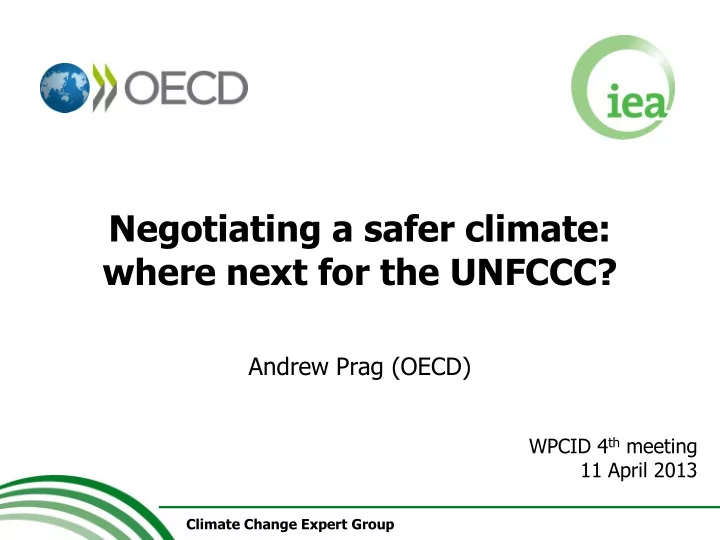

Negotiating a safer climate: where next for the UNFCCC? Andrew Prag (OECD) WPCID 4 th meeting 11 April 2013 Climate Change Expert Group
Overview 1. Emissions and vulnerability to climate change 2. The UN climate talks: past and present 3. Looking forward: what role for the UNFCCC? Climate Change Expert Group 2
Breaking down the problem 8000 100% Cumulative % of world emissions 90% 7000 80% 80% 6000 70% 5000 Index / percentage 60% Vulnerability ratings R² = 0.4 Mt CO2 4000 50% 40% 3000 30% 2000 20% 1000 10% 0 0% 1 11 21 31 41 51 61 71 81 91 101 111 121 131 141 151 161 171 181 20 countries Countries (decreasing emissions) CO2 Mt CO2 %cum Vulnerability Index Vulnerability trend Data sources: IEA CO 2 emissions from fuel combustion, GAIN vulnerability index index.gain.org Climate Change Expert Group Note that if all GHG emissions are included, overall picture is similar but country order changers 3
Overview 1. Emissions and vulnerability to climate change 2. The UN climate talks: past and present 3. Looking forward: what role for the UNFCCC? Climate Change Expert Group 4
1972- ’90 1992 1994 1997 2001 2005 2007 2009 2011 2012 2015 2008-12 KP Stockholm Conference, Brundtland Report first period UNFCCC signed UNFCCC entry into force Kyoto Protocol signed Marrakech Accords Kyoto entry into force Bali Action Plan agreed The long and arduous Copenhagen Accord journey attempting to tackle Durban Platform global climate change through multilateral Doha Gateway,KP 2 nd period negotiations New Agreement applicable to all Climate Change Expert Group 5
What did Doha achieve? Kept the show on the road The Kyoto Protocol limps on (towards retirement) Negotiations now focused on the Durban Platform Compensation fo r “Loss and Damage” formalised Climate Change Expert Group 6
Overview 1. Emissions and vulnerability to climate change 2. The UN climate talks: past and present 3. Looking forward: what role for the UNFCCC? Climate Change Expert Group 7
In Conclusion….. UNFCCC Mitigation action International co-operation Climate Change Expert Group 8
What has the UNFCCC achieved in practice? We know in detail what we’re dealing with: IPCC and country-level inventories It has made the world’s biggest collective problem a serious diplomatic issue for many countries It was the catalyst for market-based carbon pricing systems (EU ETS, Australia, … ) Through the Clean Development Mechanism, it brought emissions accounting to industry in developing countries We have the concept of climate finance for mitigation and adaptation, and vehicles such as the Green Climate Fund Climate Change Expert Group 9
And what has the UNFCCC NOT achieved? The legally-binding nature of Kyoto Protocol was arguably ineffective – countries complied when they wanted to It has not yet delivered an instrument that is “applicable to all”, let alone applied by all It has not yet achieved a scaled-up carbon market under UNFCCC governance The multilateral process is vulnerable to political blockading and brinkmanship Can we identify an impact on the global emissions trajectory to date? Climate Change Expert Group 10
UNFCCC signed Bali Action Plan agreed Stockholm Conference, Brundtland Report Kyoto Protocol signed Climate Change Expert Group 11
Why we still need the UNFCCC This is a collective-action problem and we need a collective-action solution at the heart of it Even without top-down targets and timetables, multilateralism can provide transparency, scrutiny and international peer-pressure on domestic policy-making Visibility and profile of the international process can provide democratic leverage domestically International linking of market approaches remains a cost-effective ideal, and UNFCCC can act as a standard- setter to facilitate that goal Channels for funding adaptation and protecting the most vulnerable Climate Change Expert Group 12
Thank you andrew.prag@oecd.org www.oecd.org/env/cc/ccxg Climate Change Expert Group 13
Recommend
More recommend